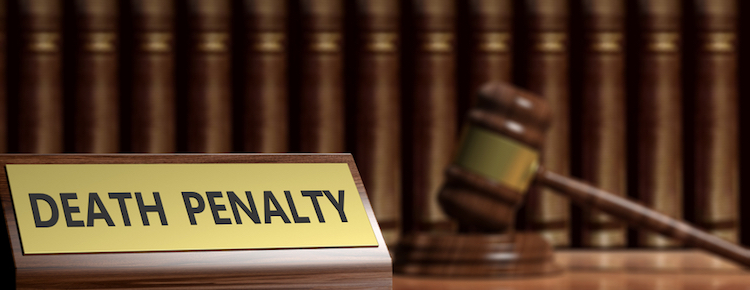SCOTUS should not restrict counsel's investigations in death penalty cases, ABA says

Image from Shutterstock.
In an amicus brief filed Monday, the ABA urged the U.S. Supreme Court to reaffirm that counsel representing habeas petitioners should be able to investigate new evidence without first proving that the evidence will provide relief to their clients.
“Counsel is obliged to conduct adequate investigations at each stage of the case, and the evidence that will emerge is never foreordained,” according to the ABA’s amicus brief. “The facts discovered through a reasonable investigation will inform counsel’s ascertainment of available claims, but they may also establish the procedural viability of a claim, particularly in federal habeas proceedings in which no sufficient investigation has been performed by prior counsel (who may also be unavailable or uncooperative).”
The ABA filed the amicus brief in Shoop v. Twyford, a case involving a death row inmate who requested transport to a hospital for a neurological examination that could support claims that his trial counsel was ineffective.
An ABA press release is here.
Raymond Twyford was convicted of murdering his stepdaughter’s rapist and sentenced to death in 1993. Ten years later, while imprisoned at the Chillicothe Correctional Institution, a state-run medium security prison in Ohio, he filed a habeas petition in federal court asserting that his attorney failed to investigate and document evidence of his severe neurological impairment.
According to Twyford’s brief, he was physically abused and raped as a child and young adult. At age 13, he shot himself in the head, destroying his right eye and lodging more than 20 bullet fragments in his brain.
Twyford was evaluated by Dr. Douglas Scharre, a neurologist at the Ohio State University Wexner Medical Center who recommended that he undergo additional testing. The district court granted Twyford’s request, and in August 2021, the 6th U.S. Circuit Court of Appeals at Cincinnati affirmed.
The 6th Circuit cited the All Writs Act, which says courts “may issue all writs necessary or appropriate in aid of their respective jurisdictions and agreeable to the usages and principles of law.”
“A district court has the authority under the All Writs Act to order the state to transport a habeas petitioner for medical imaging in aid of its habeas jurisdiction,” the appeals court said. “Such transport orders do not conflict with habeas statutes or the common law and are consistent with congressional intent to provide for counsel for capital defendants.”
Tim Shoop, the warden of the Chillicothe Correctional Institution, has argued that federal law permits courts to issue a writ of habeas corpus ordering the transport of a state prisoner only if “necessary to bring him into court to testify or for trial.”
In his cert petition to the Supreme Court, he said several circuits, including the 7th Circuit at Chicago, have not allowed courts to use the All Writs Act to compel the transport of inmates who hope to develop evidence for habeas cases.
Shoop also pointed out that the 9th Circuit at San Francisco and the 10th Circuit at Denver required a habeas court to consider the admissibility of evidence before issuing orders that facilitate the gathering of the evidence.
“Thus, in comparison to habeas petitioners in the 9th and 10th Circuits, petitioners in the 6th Circuit will be able to ‘proceed in reverse order by collecting evidence before justifying’ the need to do so,” Shoop said.
The Supreme Court agreed to hear the case Jan. 14 and set oral argument for April 26.
ABA argues for effective representation in capital cases
The ABA does not take a stand on the death penalty but has long advocated for capital cases to be adjudicated fairly and impartially.
In its amicus brief, the ABA cited the ABA Guidelines for the Appointment and Performance of Defense Counsel in Death Penalty Cases, which detail counsel’s obligation to conduct thorough investigations. The association said the guidelines were created with input from capital defense counsel, academics and judges who have decades of experience in the criminal justice system.
“The court should be wary of requiring federal habeas courts to constrict investigations in ways that conflict with the professional obligations of the attorneys appearing before them,” the ABA said. “To understand the critical function served by such counsel’s investigation, this court has looked to the prevailing norms of practice memorialized in ABA professional guidelines and standards.”
In particular, Guideline 10.7 states that counsel “at every stage have an obligation to conduct thorough and independent investigations relating to the issues of both guilt and penalty.” Guideline 10.8 also suggests that counsel thoroughly investigate all claims before deciding whether or not they be asserted.
Guideline 4.1 additionally recommends that counsel “receive the assistance of all expert, investigative and other ancillary professional services reasonably necessary or appropriate to provide high-quality legal representation at every stage of the proceedings.”
The ABA also cited the Supreme Court’s 2018 decision in Ayestas v. Davis, which rejected a lower court’s holding “that individuals seeking funding for [specialized] services must show that they have a ‘substantial need’ for the services.” According to Section 3599 of the U.S. Code, indigent defendants have the right to “investigative, expert or other reasonably necessary services at any time either … before judgment,” or “after the entry of a judgment imposing a sentence of death but before the execution of that judgment.”
“The court should not disturb its recognition in Ayestas that investigations must come before a decision on the merits in a habeas proceeding,” the ABA said in its amicus brief. “An independent and adequate investigation by counsel—and the resources necessary to that investigation—naturally must precede the court’s determination as to whether the habeas petitioner’s claims have substantive and procedural merit.”



